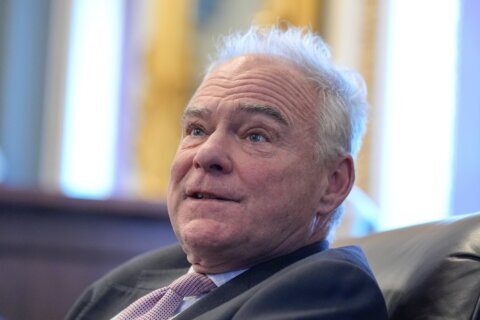Two members of Congress say a foreign country is blocking their visit with a bipartisan congressional delegation.
It may sound familiar, following Israel’s recent dispute with two Democratic congresswomen. But this is different.
One lawmaker is a Republican and the other is a Democrat. And the country they’re seeking to visit is Russia.
Sens. Ron Johnson, R-Wis., and Chris Murphy, D-Conn., are members of the Senate Foreign Relations Committee, and had planned to visit Russia with a bipartisan congressional delegation next week.
Johnson has issued a statement sharply critical of Russia, saying the country has denied his visa. He said Russian President Vladimir Putin has invaded Georgia, attempted to illegally annex Crimea and conducted war in eastern Ukraine. He also criticized him for not holding free and fair elections.
“I had hoped direct dialogue with Russian parliamentarians could help set the stage for better future relations between our two nations,” he said, accusing Russian officials of playing “diplomatic games” and calling it a “petty affront” not to allow his visit.
Murphy on Tuesday said he’s also been denied.
“While I’ve been a tough critic of the Kremlin, I also believe it’s important to maintain dialogue especially during moments of tension,” he said in a statement, which referred to the “collapse” of recent arms control agreements.
Johnson has also co-sponsored legislation to rename a street in front of the Russian Embassy in D.C., after dissident Boris Nemtsov, who was assassinated in Moscow 2015. The D.C. Council last year approved legislation making the name change, in honor of the pro-democracy leader
President Donald Trump on Monday, following the G-7 summit in France, said he planned to invite Putin to attend the summit next year, which will be held in the U.S. Russia had been kicked out of the group of countries after its 2014 annexation of Crimea.
Johnson visited Russia with a delegation last year and some at the time criticized lawmakers for not being tougher on Russia. Johnson in his latest statement did not mention Russia’s meddling in the 2016 presidential campaign, which was the focus of the report from former special counsel Robert Mueller and his testimony to lawmakers earlier this summer.
But Johnson’s statement, released on Monday, blasted Russia on several fronts. In addition to criticizing its military incursions, Johnson also said Russia has “supported a barbaric regime in Syria that has used chemical weapons on its own people in a war that has result in the deaths of hundreds of thousands.”
Johnson is the chairman of the Senate Foreign Relations Committee’s Subcommittee on Europe and Regional Security Cooperation. He said he had planned to speak with Russian government officials, American businesses and other groups during his visit.
The Russian government on Tuesday denied on Twitter that it has tried to prevent Johnson’s visit, saying he did not apply for a visa at its embassy and didn’t inform the government about his trip.
We have long been calling on the #UnitedStates🇺🇸 to remove lawmakers from any travel restrictions as a first step towards abolition of «blacklists». #BTW the senator did not apply for a visa at our Embassy and did not inform about his plans to visit @Russia🇷🇺 https://t.co/SQLA4uvKPh pic.twitter.com/RQXBHozJg0
— Russia in USA 🇷🇺 (@RusEmbUSA) August 27, 2019
Last week, two Democratic congresswomen lashed out at Israel for initially banning them from making a visit. Rep. Rashida Tlaib, D-Mich., and Rep. Ilhan Omar, D-Minn., also blamed Trump for encouraging the Israeli government not to allow them to travel to the country.
Israel eventually said Tlaib could visit her Palestinian grandmother on the West Bank, but couldn’t publicly encourage a boycott of Israel during her trip. Tlaib said the conditions set by the Israeli government were too restrictive, and she declined to go








